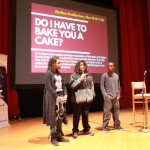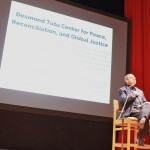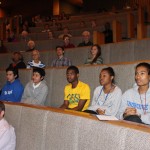On November 11th, 2015 the Desmond Tutu Center hosted the “Dare to Dream” event during which Allan Boesak discussed his experience resisting apartheid in South Africa.
 To begin the evening, three interns from the Kheprw Institute, Asli Myaafrika , Ajaani Johnson, and Rasul Palmer (ages 13, 13, and 19), took the stage to speak. Kheprw Institute is a community group that creates a welcoming community in which they empower young people and encourage entrepreneurship. These three impressive youths shared their experiences at Kheprw, and played a video in which they interviewed other youth ages 5-15 . In this video, a dozen or so youth shared their aspirations to become doctors, actors, and artists, after which they explained the obstacles that could hinder those dreams. The students also discussed the need to rise above those obstacles by never giving up. The video ended with, “In the words of Shia LaBeouf, ‘Do it!’”
To begin the evening, three interns from the Kheprw Institute, Asli Myaafrika , Ajaani Johnson, and Rasul Palmer (ages 13, 13, and 19), took the stage to speak. Kheprw Institute is a community group that creates a welcoming community in which they empower young people and encourage entrepreneurship. These three impressive youths shared their experiences at Kheprw, and played a video in which they interviewed other youth ages 5-15 . In this video, a dozen or so youth shared their aspirations to become doctors, actors, and artists, after which they explained the obstacles that could hinder those dreams. The students also discussed the need to rise above those obstacles by never giving up. The video ended with, “In the words of Shia LaBeouf, ‘Do it!’”
After the inspiring video, Allan Boesak was introduced. Allan’s speech centered around the importance of never giving up the dream of reconciliation, or losing determination against those who seek to put you down. Allan described a formative event for the movement when
 20,000 women marched to the government buildings and sung in protest. Allan stated. “Sing out of the joy of knowledge…that what we have is a certainty that things will not end here.” Unfortunately, the struggle against apartheid was much longer and more arduous than any had imagined, and there were many victims. Through it all, the people never surrendered their dream, and they never capitulated under the weight of bigotry and persecution. “If we allow them to kill the dream of freedom and justice, then that will also kill the dream of reconciliation.”
20,000 women marched to the government buildings and sung in protest. Allan stated. “Sing out of the joy of knowledge…that what we have is a certainty that things will not end here.” Unfortunately, the struggle against apartheid was much longer and more arduous than any had imagined, and there were many victims. Through it all, the people never surrendered their dream, and they never capitulated under the weight of bigotry and persecution. “If we allow them to kill the dream of freedom and justice, then that will also kill the dream of reconciliation.”
 After Allan’s speech, there was a short Q+A session. One of the most interesting questions posed was about how far one is willing to ago in fighting an oppressor. When is violence okay? The example used in the question was how Dietrich Bonhoeffer ultimately decided to use violence against Hitler during World War II. In response, Allan expressed the difficulty in making the decision to turn to violence. When one is fighting against an evil that knows no morals and has no compassion, it can be very challenging to progress using pacifistic methods. This is why many oppressed people feel it is necessary to use violence in order to achieve any progress. Allan stated that there can be no real justification for this decision, and all one can do is ask for forgiveness. One powerful statement Allan made was, “In killing that person, what have I done to myself?” With this, Allan explained the detrimental aspect violence can have against the soul, and the resulting weight of considering it as an option. For Allan personally, violence is never the answer, and there is always a better way to attain justice.
After Allan’s speech, there was a short Q+A session. One of the most interesting questions posed was about how far one is willing to ago in fighting an oppressor. When is violence okay? The example used in the question was how Dietrich Bonhoeffer ultimately decided to use violence against Hitler during World War II. In response, Allan expressed the difficulty in making the decision to turn to violence. When one is fighting against an evil that knows no morals and has no compassion, it can be very challenging to progress using pacifistic methods. This is why many oppressed people feel it is necessary to use violence in order to achieve any progress. Allan stated that there can be no real justification for this decision, and all one can do is ask for forgiveness. One powerful statement Allan made was, “In killing that person, what have I done to myself?” With this, Allan explained the detrimental aspect violence can have against the soul, and the resulting weight of considering it as an option. For Allan personally, violence is never the answer, and there is always a better way to attain justice.
Watch the entire event HERE



